The Japanese Hospital Cooperation Council began in Brazil. This new forum for discussion is not only building connections between Japanese hospitals in Brazil aimed at improving medical services but it is also building new relationships between Japan and the Japanese community in Brazil through medical care.
By TSUBONE Ikumi

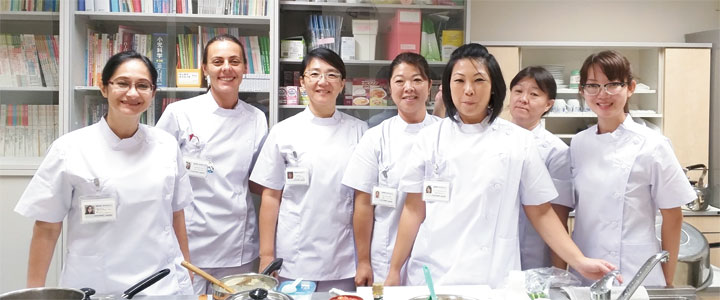
"Creating recipes that incorporate the best of Japanese foods"
Nutritionists at Japanese hospitals who are developing recipes for hospital food under the Council's "Nutritionist Project."
Deepening exchanges with Japanese hospitals
Founded and operated by Japanese descendants, Japanese hospitals are scattered throughout Latin America in Peru, Argentina, and Bolivia, etc. Among these, Brazil is aiming to further improve its medical services by strengthening cooperation with Japanese hospitals in the country. It is the Japanese Hospital Cooperation Council that has taken the lead in these discussions. Mr. Hiroshi Sato, Director of the JICA Brazil Office reflected that "In the past, JICA had an initiative where representatives of Japanese hospitals in Brazil were invited to Japan to observe Japanese medical technologies and services. This created an opportunity to approximate Japanese hospitals in Brazil, which had not previously had very much interaction until then, and these Japanese hospitals in Brazil began to seek opportunities to get together and talk." In May 2018, the 1st Japanese Hospital Cooperation Council was held in response to requests from JICA to Japanese hospitals in Brazil.
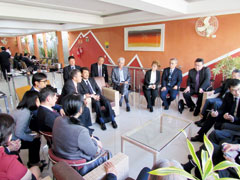
"Let's further deepen cooperation"
Various opinions are exchanged in discussions between Japanese hospitals in Brazil.
From the second meeting onward, these have been hosted by the Japanese hospitals in Brazil, and three meetings have been held so far. The program consists of a first part which is mainly about exchanging opinions between the Japanese hospitals and a second part in which medical related Japanese companies and Japanese companies in Brazil join and make proposals etc.. In addition to the Presidents and Directors of Japanese hospitals in Brazil, the Japanese Consulate General in Sao Paulo, Japanese medical device manufacturers, and Japanese university officials also participated, and at the third meeting the number of participants reached as much as 80 people. This Council has two major purposes. The first is to deepen cooperation between Japanese hospitals in Brazil. The second is to develop relationships with Japanese companies, universities, and hospitals to incorporate the best products and technologies, and expertise into Japanese hospitals in Brazil. To achieve this, at the third meeting teams formed by Japanese medical device manufacturers and doctors and nurses made presentations regarding medical products. This received favorable reviews since s it made it easy to get an image of how use these products, by hearing stories from doctors and nurses who use them on a regular basis. This was said to be an incorporation into the Council's program of a project called "Showroom" which had originally been created by the Santa Cruz Hospital, one of the participating hospitals.
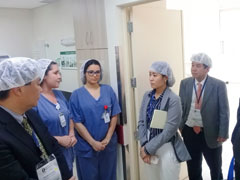
"I understand the hospital's efforts!"
At the second meeting there was a tour in the participating Japanese hospitals in Brazil.
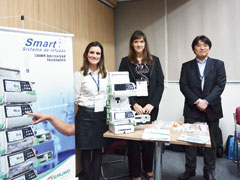
There was also an exhibition introducing Japanese medical devices.
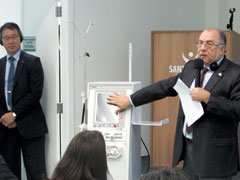
The "Showroom" at the third meeting.
Chief Representative of the JICA Brazil Office Mr. SATO Hiroshi
"The Japanese Hospital Cooperation Council, which is a gathering of 6 Japanese hospitals in Brazil, has been attracting the attention of many Japanese companies as an opportunity for them to develop a market. Cooperation between Japan and Brazil will continue into the future through medical care."
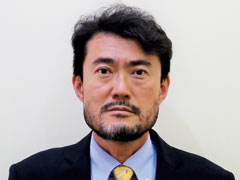
Mr. SATO Hiroshi
Aiming to improve the health of society as a whole
There are new projects born out of Council discussions. One of these is the "Nutritionist Project". This began with the proposal of Santa Cruz Hospital at the first meeting to "incorporate Japanese food into hospital meals with the aim of popularizing Japan's proud tradition of healthy foods throughout Brazil." Hospital Director Renato Ishikawa says "We have served Japanese food at Santa Cruz Hospital for a long time.
I think that if we could improve the quality even more, we could bring the beauty of Japanese food not only to Brazil but throughout Latin America, contributing to improve health in society as a whole." After this, training was held at Kyushu University with the cooperation of JICA to learn about Japanese hospital meals, and 7 nutritionists participated from mainly 6 Japanese hospitals in Brazil. These nutritionists are currently developing recipes for Japanese hospital meals with Kyushu University. When a recipe book has been completed, they are thinking about sharing this information not only with Japanese hospitals in Brazil, but also with all hospitals throughout the country.
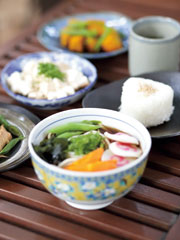
Hospital food provided at Santa Cruz Hospital, incorporating Japanese food.
The Council will continue to meet regularly going forward and will also be useful for exchanging information between Japanese hospitals in Brazil during these Covid-19 times. Mr. Ishikawa spoke powerfully about his new role, saying "Going forward, I intend to call on the next generation of Japanese descendant doctors to join us. Many of them don't speak Japanese and have never been to Japan, but they certainly have their roots in Japan. I feel that the Council has a role in supporting the next generation of Japanese descendent doctors."
President of the Santa Cruz Hospital Mr. Renato Ishikawa
"As a Japanese hospital, we cherish our Japanese roots. Also, in collaboration with other Japanese hospitals, we want to deepen our Japanese services including Japanese hospital food, etc."
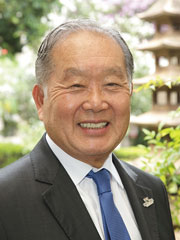
Mr. Renato Ishikawa
Textbooks developed in Central America are also used in Japan
In the 1990s, JICA implemented cooperation with four Spanish-speaking countries in Central America to improve the quality of mathematics education. One of these initiatives involved the development of mathematics textbooks to be used in primary and secondary education. As a spillover effect, mathematics textbooks developed in Honduras from the first to sixth grades, elementary school, were donated to the Multicultural Children's Center in Hyogo Prefecture. These project deliverables increased learning opportunities for children in Japan whose first language is Spanish. Textbooks, teachers' guides and student exercise books made in El Salvador from the first grade, elementary school through the second grade, high school, have been uploaded and are accessible on the JICA website.

Honduras

El Salvador
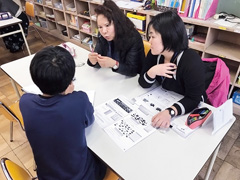
Japanese teacher and a child at an elementary school whose first language is Spanish learning with arithmetic exercise books developed in El Salvador.





scroll